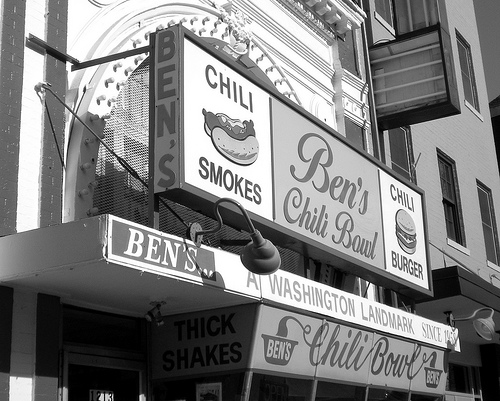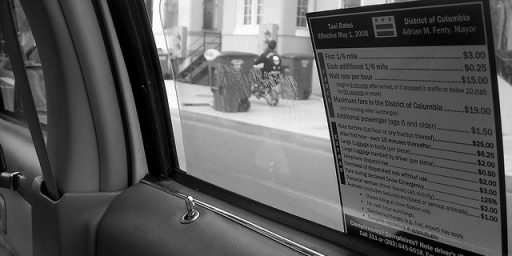DC Thriving During Recession
 NYT urban planning professor Mitchell Moss has taken to the pixels of something called New Geography to point out what most of us already knew: Washington, DC thrives during bad times for the rest of the country. His historical discussion of the District’s evolution from swampy backwater to major city is interesting.
NYT urban planning professor Mitchell Moss has taken to the pixels of something called New Geography to point out what most of us already knew: Washington, DC thrives during bad times for the rest of the country. His historical discussion of the District’s evolution from swampy backwater to major city is interesting.
But this, I think, goes too far:
Washington has always been a one industry town: that’s why it has an intrinsically self-absorbed monotonic culture. Everyone there depends on government for their livelihood. It is fundamentally not a city of competitive industries, but a giant taxpayer-funded office park, surrounded by museums and memorials.
That’s pretty much what I thought, too, before moving to the area seven years ago. There’s no doubt that DC only exists because it’s the seat of national power and that lobbyists, lawyers, contractors, and others are employed in lucrative jobs serving or seeking to influence government.
But the vast number of people here, as in most major cities, are employed in the service economy. I’m not sure why dry cleaners, car salesmen, restaurant managers, pet groomers, golf pros, auto mechanics, gardeners, HVAC technicians, barbers, or whathaveyou who work in a metroplex where government is the chief employer are any different than those in towns where banking, manufacturing, or some other line of work is central.
Now, it is true that those of us who work in the general public policy nexus are more absorbed by national and international politics than the average Joe. There’s a veritable army of think tankers, journalists, and activist types who derive little or no money directly from government but who are nonetheless deeply engaged in wonkish activity. And wonks tend to hang out with other wonks and talk about wonkish things. I don’t know that this amounts to being “self-absorbed” but it’s somewhat monotonic.
This one, though, is bizarre:
There is one unambiguous measure that signals the growth of business activity within a city. Until recently, taxi fares in the nation’s capital were based on zones. These made it very inexpensive for members of Congress to go to and from the Capital. Today, every DC taxi has a meter and the old-fashioned zone-based system has been abolished. Both the municipal government and taxi drivers understand that there are more dollars to be made from those seeking to influence government than those who actually make the laws.
Apparently, Moss doesn’t read the Washington Post and has never ridden a DC cab. The taxi companies fought metering hammer and tong, going so far as to engage in strikes over the policy change. The zone system was hated by tourists and other infrequent users because two trips of identical distance could have wildly different charges. Locals would have the cabbie stop a couple blocks away from their final destination to avoid going into another zone; others had no clue.
Photo by Flickr user Kevin H under Creative Commons license.






While the statement that DC is a tax-payer funded office park is a bit simplistic, I believe you missed the essential point. That is all those service industry workers, think tankers, journalists and activists indirectly exist and derive their income from the government industry in DC. If government was by some miracle reduced and limited, they would suffer an economic decline that no other industry in DC would replace. In any case, obviously all cities have infrastructure people who do not engage in the primary industry(s) but rather keep the place going for those who do.
I was just reading Paul Graham’s essay on Cities and Ambition. He discusses that cities that are centers of ambition send a message to their inhabitants. A message that draw those with similar ambitions to those cities. Such as New York’s “you should have more money,” or Silicon Valley’s “you should have more power” (money is power but Silicon Valley is not impressed with inherited money) or LA’s “you should be more famous.” I’ve tried to come up with DC’s message. It seems to be “you should screw with more people’s lives.” DC is filled with people who mix and mingle as they try to come up with ways to make people “better.” Mostly in ways divorced from the self-determination and reality of those peoples’ lives. This is a change from the original intent of government which was to create an arena where people could succeed protected from outside aggression. But who wants to serve the public when you can be its master.
In the end, DC lives or dies not only by one industry but it is a one company town. It’s denizens either work for, work to influence that company or work to provide services to those that do. I remember the concerned articles in the WP back in 2000 or so about the unseemly influence of the new IT industries in North Virginia and those people taking up places at the DC events. But that ended quickly with the last recession and the fact that those businesses were more DC like in that they mostly were based on fraud and deception.
I can’t believe they got rid of zones. Where’s the challenge for the experienced rider?
I haven’t been in a DC cab in a while, but I used to live in them when I worked as a flunky for a DC law firm.
Another beloved but really stupid bit of my past swept away . . .
Local services are to a large extent dependent upon core industry. If Fort Hood up-and-moved to Colorado, most of the dry cleaners, barbers, taverns in Killeen, TX would either have to follow the soldiers or go out of business. Other towns that have more diversified economies are less vulnerable to cyclical shocks.
But the government isn’t going anywhere. Perhaps if R/n P/ul got elected (along with sympathetic majorities in both houses of Congress), and we started gutting domestic and foreign commitments wholesale, the local Washington economy might contract. That seems unlikely; the party that attracts most of the “less government” vote had control of all three branches of government from the beginning of 2003 through the end of 2006, yet government growth proceeded apace.
Sure. But as dry cleaners in Killeen radically different from those in, say, Arlington, Virginia? Or, for that matter, towns without a large Army base or government employment?
James, if our federal government in its wisdom decided to move lock, stock and barrel to Nebraska over the next ten years, don’t you think Washington D.C. would start to look a lot like Detroit? And Maryland would start to resemble Michigan?
Would you be surprised that a lot of new restaurants, theaters, grocery stores and dry cleaners suddenly sprang up in Nebrasks and that an unusually large number of immigrants from all over the world would start to flock to Nebraska rather than the Washington, DC area?
This is like basic logistics in the military. It takes a lot of support personnel to make it possible for those very few who are actually wielding the spears. All of those who will never qualify for AFSCME membership or make $100,000 a year still earn their pay from the government in a “stimulus” or Keynesian “multiplier” manner.
Maybe this is what you said above, I’m not really sure.